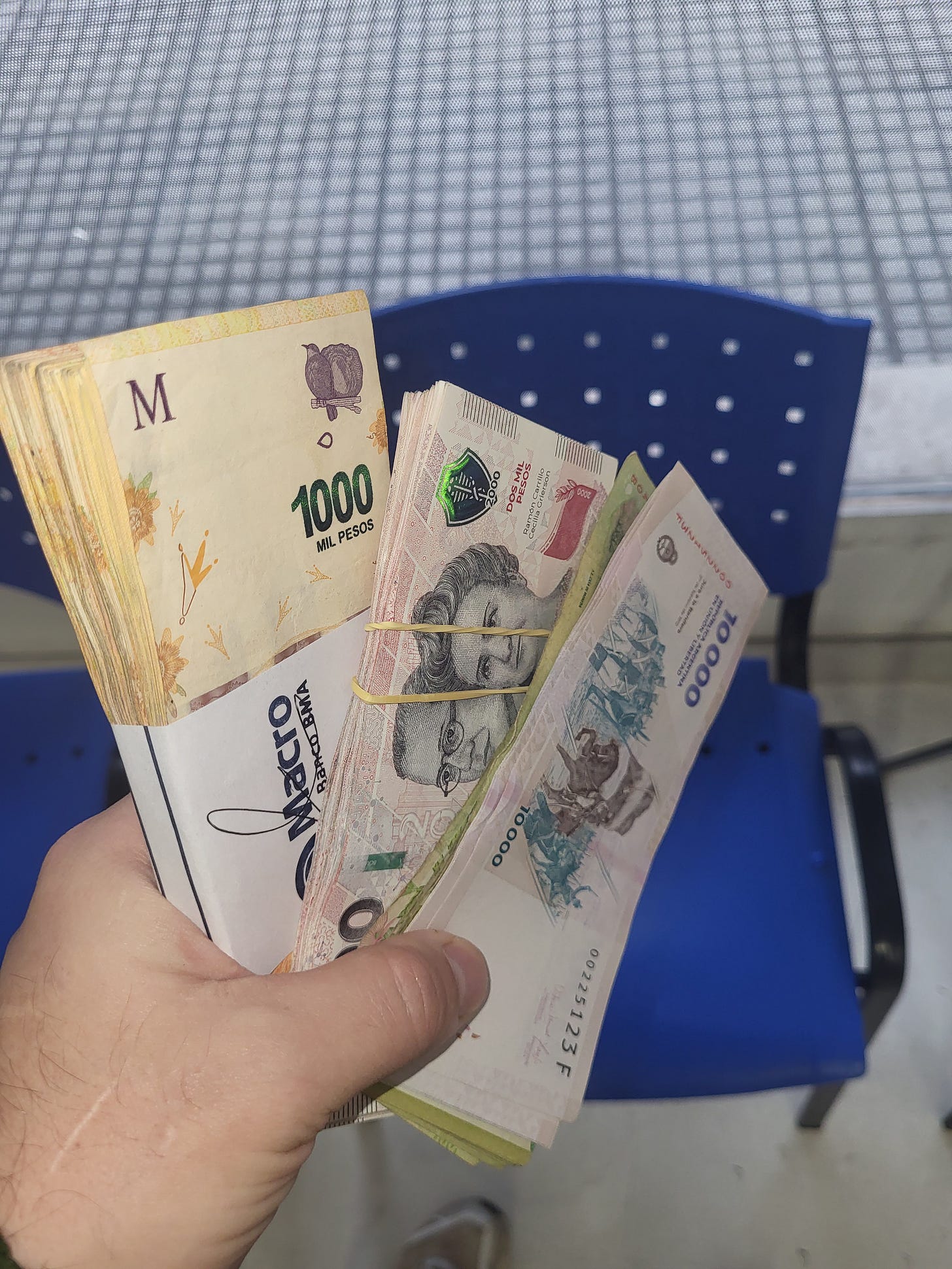Argentina's Faded Dream Is a Warning to America
Reflections on Argentina's Past and Present from the Caves of Buenos Aires
Last week, my missus, the kids, and I left our green refuge in Paraguay for the country of Argentina.
Despite being just a 2-hour flight from Asuncion, the capital of Paraguay, Buenos Aires feels worlds apart. Asuncion is cozy and relaxed, while Buenos Aires boasts grand European-style buildings, a bustling vibe, and crowds always in a rush. Plus, being in the Southern Hemisphere, the weather is much colder here in winter.
Whenever I'm Argentina, I’m reminded of what the country could have been.
Not many people know this, but in the late 19th century, Argentina was the richest country in the world. It had a GDP per capita of $5,786, with the United States in second place and Belgium in third.
In fact, Argentina was so rich that the French used the phrase “riche comme un Argentin” (“rich as an Argentinian”).
The South American nation had all the ingredients to become the 20th century’s ultimate success story. But it didn’t. Instead, it has become one of the world's poster children for hyperinflation, out-of-control government, and economic mismanagement.
Ironically (though not surprisingly), these reflections often catch up with me when I'm exchanging money here. It happened just a few days ago. I stopped by one of the local currency exchange places, which are commonly called “cuevas” here (literally, “caves” in English), to change some of my dollars. As the saying goes, a picture is worth a thousand words, so here’s a photo of the cash I got.
The image doesn’t do justice to the weight of this stack. Mind you, this is barely $150.
Just the other day, I also helped a friend exchange a much larger sum—several thousand dollars. We ended up with so many notes that he had to go back home to grab a backpack while I stayed behind to keep an eye on the cash. We packed it to the brim.
Doug Casey often talks about what happened in Germany in the 1920s. People used wheelbarrows full of cash just to buy a loaf of bread. It’s not exactly the same in Argentina, but you do feel like a paper millionaire when you stuff your pockets with thousands of pesos—way too much to fit in your wallet—just to cover a day’s expenses.
From Riches to Rags
You're probably wondering, how did Argentina go from being the richest country in the world to 142nd in GDP per capita a century later?
To answer this, it's key to know that while Argentina, like the U.S., has abundant natural resources, its past prosperity mainly came from free-market policies. These included sound money, low taxes, minimal regulation, and free trade. Things went downhill as Argentina turned its back on these proven economic policies.
The pivotal moment came in 1946 when Argentines elected Juan Perón, a military strongman who put the state at the center of everything.
He believed that heavy public spending, government intervention, and money printing were the answers to any problem.
Perón imposed strict government control and handed out freebies and welfare to the poor. That made him a lasting icon, but it changed the country’s moral fabric from self-reliant people to those who think they can get a free lunch by voting for a Peronist.
This doomed Argentina to a cycle of constant decline and economic crises. Perón's followers, known as Peronists, get elected with promises of freebies, spend until they can't borrow anymore, and then print money to fund even more spending. This drives up prices as the currency loses value. A mild reformer might then come in to fix things, but their reforms usually don’t tackle the root issues. Still, they cause pain and are unpopular, so people vote in another Peronist promising more “free” stuff, and the cycle starts again.
The result? An entire century of lost progress. The next chart shows how Argentina's GDP per capita dropped compared to the U.S. since the early 1900s.
Today, Argentina's GDP per capita is under 18% of the U.S. level, and around 57% of the population lives in poverty.
I’ve spent some time in the country over the years and always thought it was destined to repeat the cycle I mentioned earlier. That was until something major happened in November 2023.

To be continued….
Regards,
Lau Vegys
P.S. In case you're wondering why you should care about a remote country in South America, Argentina is a cautionary tale of a top dog falling flat on its face. Its parallels with the U.S. are unmistakable, and its story should be taught in every American school. But it's not, and today, America is barreling down the same path at breakneck speed. The rise of socialism, the call for more freebies from the masses—free medical care, free college, free housing, free food, and so forth—and power-hungry politicians looking to cash in are driving this train wreck. By looking at Argentina’s experience, we can get an idea of where all these things may lead us and act accordingly.







Nice take Lau. If you think the US is heading down the socialist path then chekc out the policies in countries such as Canada the UK, & even Australia (but we are always a few years behind, copying what we see abroad).
If you measure Argentinas GDP at the exchange rate that reflects reality in the economy (blue rate) you get a figurer which reflects close to a typical salary in West Africa - then run that number against USD GDP per capita - it's horrendous.
I'm hoping Argentina can keep faith in Milei in the mid-terms next year. He currently has minimal congress support but everyday the kukas (kirchnerists) keep torching themselves with scandals and it's the media is fully exposing them.
Stay tuned for the next episode shortly - currently they're going through the kirchnerist ex-presidents phone and finding some very concerning events which is killing their public support!
I am headed to Argentina on my third trip in a year.
I will bring my niece for her introduction to the family.
This time our corporation is established as a SRL. The baby is released from the hospital to live a full life.
We are headed to Mendoza during the stay for a wonderful experience.
The open step, curious mind seeking new experiences.